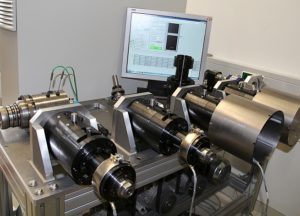Lubricants
Research on simple and rapid test methods for basic development

In an endurance run test grease is mechanical-dynamically loaded in roller bearings under lab terms to win data for the development of a screening test method. Photo: Kompetenzzentrum Tribologie
Lubricants, which can roughly be broken down into oils and greases, have a variety of tasks. They are used to reduce friction and wear, to transmit forces, for cooling and damping vibrations, for sealing and protecting from corrosion. In principle, all lubricants consist of a base liquid (base oil) and other components, so-called additives. The properties of greases, for example, can be optimised for a wide variety of applications by the selection of appropriate base oils, thickeners and additives. There are greases for high temperature or low temperature applications, as well as for applications in vacuum. They can be food safe, water-resistant, pressure-resistant and even adhesive. The variety of properties, different applications and ever-stricter requirements make the development of lubricating oils and greases an extremely challenging process. The assurance of service times plays an important role for the development of a grease, since the lifetime of technical components such as grease-lubricated roller bearings, is often considered equivalent to the lifetime of their grease and thus is an important economical factor.
Various mechanical test methods are used to determine the robustness of greases and the changes of chemical and physical properties. From these tests, conclusions can be drawn about the applicability of a grease for a specified task. Tribology testing apparatus such as the FE 8 (DIN 51816) or FE 9 (DIN 51821) methods simulate requirements and test grease formulations. Since the individual tests are very time-consuming and costly, however, they are not suitable for the basic development of lubricating greases. Especially at the early stages of development there is a need for numerous iterative test cycles and each additional cycle is significantly increasing the costs. For small and intermediate companies this testing period noticeably stresses the R&D budget.
Together with partners, OWI Science for Fuels develops simple and rapid screening-methods to achieve a significant reduction in development time for lubricants. For this purpose, OWI transfers proven methods from the fuels area to the lubricants area and combines them with dynamic mechanical procedures like the dynamic mechanical roller bearing test in a roller bearing test bench. These methods bears the potential to decrease the run time of the test cycles, which enables an improved determination of the grease lifetime.
